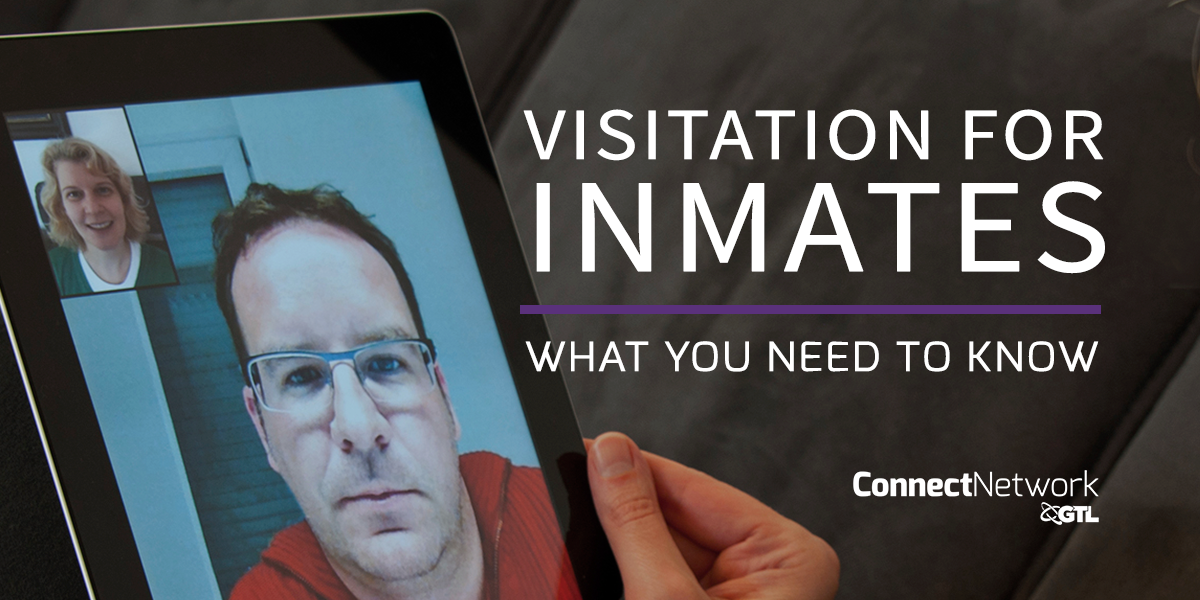Visitation for Inmates: What You Need to Know
June 09, 2016
Visitation for inmates is often the most widely discussed inmate right when a family member or loved one has entered a correctional facility.
For a first time visitor, gaining access to see your loved one can be a confusing and anxious experience. With the right preparation and resources, difficulties can be avoided and both you and your loved one can get the most out of the visitation experience.
Let’s review what types of visitation could occur, and the steps you’ll need to take to schedule a visit.
Types of Visitation for Inmates
Depending on the facility in which your loved one is incarcerated, the actual visit may occur in one of three ways:
1. Video Visitation
Video visitation for inmates is becoming increasingly common. There are also two types of video visitation offered in the industry—but not all facilities offer each type.
Internet Video Visitation – This option allows you to complete a video visitation from your own home. Similar to Skype or FaceTime, video visitation allows you to connect with your loved one via your computer, tablet or smartphone versus physically going to a facility.
Onsite Video Visitation – This option requires you to go to the facility and visit your loved one via a video terminal in the visitation lobby.
2. Non-Contact or Telephone Visitation
Non-contact or telephone visitation for inmates includes glass partition visits.
This is when you and your loved one are separated by a glass partition and can communicate via a telephone while physically seated across from one another.
3. Contact Visitation
You are able to visit your loved one and sit at a table for a period of time. Physical contact is limited and varies by facility.
Gaining Visitation Access
Visitation allowances vary by facility, and gaining access will require completing steps specifically outlined by that facility. The fastest way to determine the visitation steps of a given location is to contact the facility directly or visit their website.
The following steps are an example of what may be required of you when you are ready to visit your loved one:
Step 1: Locating the Inmate
Many times, visitation and communication with your loved one begins with properly identifying an inmate number or ID number. If you are unsure of your loved one’s identification within the facility, request it from your loved one directly.
Step 2: Pre-approval Process
When planning a visit, you may need to be pre-approved.
The pre-approval process may include being added to your loved one’s visitor list, being cleared by the facility, and completing forms either online or by mail. Depending on the facility and the type of visitation you are seeking, you may have to do more in preparation for your visit.
Once approved, you may be able to schedule a specific visitation date and time either online through the facility visitation scheduling website or by speaking with facility staff. Not all facilities offer scheduled visits, some only allow for visitation on a first come first served basis on specific days and time. Each facility is different, be sure to check the facility website to understand your options.
Step 3: Prepare Yourself
The third step regarding visitation for inmates is to be highly prepared.
When planning an in-person visit, you want to make yourself familiar with all correctional facility visitation rules prior to arriving.
Consult the visiting policy for the specific facility so that you may locate the important things to familiarize yourself with.
These rules may include (and are not limited to):
- dress code
- visitation hours
- duration (length) of visitation
- expected behavior while in the facility
- physical contact restrictions.
Rules vary between facilities, so be aware of what will, and will not be allowed—so you do not risk being denied visitation after arriving at the facility.
Dress code is especially important and can cause you to be denied entry if your clothing is deemed provocative, provoking or inappropriate in any way.
Step 4: Planning Your Inmate Visit
The final step regarding visitation for inmates centers on planning your trip, if you are required to go to the facility for your visit.
If the facility allows for scheduling visits in advance, be sure to show up early for your visit. Scheduled visits start at the scheduled time and visitors must account for extra time to get checked in at the facility, showing up late will typically result in a shortened visit time to allow for the remaining scheduled visits to start on time after your scheduled visit ends. Again, most facilities outline the expectations on their website so you will understand if you should show up 10 minutes early or 30 minutes early, etc.
Onsite Visitation
In most cases, facilities offer some visiting hours on the weekend (Saturday and Sunday). Many facilities will also offer visitation for inmates at other times throughout the week.
Because weekends are the most popular time to visit, some facilities that rely on first come first served visitation reserve the right to limit length of visits, times of visits and overall availability in an effort to keep order in the facility.
Additional factors can play a role in the days and times when you can visit. Things like location, security, inmate needs, space and other restrictions may apply.
Be sure to coordinate with the correctional facility should you need directions (by car or by public transportation). There is no Government reimbursement for transportation. It is your responsibility to arrange your visits as they will not be arranged for you by the facility in any way.
Internet Video Visitation
With the advancements in technology and added convenience, Internet video visitation has become a widely-used alternative to in-person visits.
If your loved one is able to utilize video visitation, many of the difficulties related to onsite visitation listed above are no longer a factor.
When planning an Internet video visitation, you can consider the following benefits:
- Register and schedule a video visit online.
- Visit from the comfort of your own home.
- Eliminate transportation costs and time spent commuting.
- Visit with the whole family without having to bring young children to the facility.
- Eliminate lines and wait times; make the most of your scheduled visit.
- Confirmation of your visit is automated and you will receive all the necessary information by email
- Should your loved one need to reschedule, the automated system will inform you of any changes.
- You may be able to visit more frequently with your loved one on video than you are able to do in person.
Conclusion
Should you have additional questions regarding visiting an inmate, contact your loved one or the facility directly.
You can also use online resources for those particular facilities (like Frequently Asked Questions on the facility website), where you may find answers.
Additionally, you can join our Facebook Group to post questions and we will do our best to help you find answers.
Join us here
Posted In: Blog




